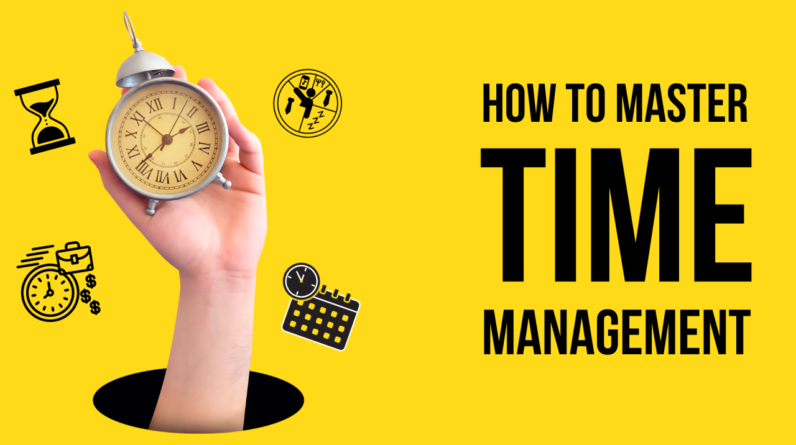
In today’s fast-paced world, effectively managing your time to balance work, school, and life is crucial. Many individuals struggle to juggle these responsibilities, leading to stress and burnout. Mastering time management is not just about being busy; it’s about being productive and making the most of the time you have. Here, we delve into the strategies and techniques that can help you achieve a harmonious balance between your professional, academic, and personal lives.
Understanding the Importance of Time Management
Time is a finite resource. How we manage it determines our success and well-being. Effective time management allows us to accomplish more in less time, reduces stress, and provides a sense of control over our lives. Balancing work, school, and personal commitments is essential for maintaining mental and physical health.
Setting Clear Goals
Prioritizing Your Tasks
One of the most effective time management strategies is prioritization. Begin by listing all the tasks you need to complete. Categorize them into urgent, important, and less critical tasks. This will help you focus on what truly matters.
Urgent Tasks: These require immediate attention and can have significant consequences if not completed promptly. Examples include work deadlines and exam preparations.
Important Tasks: These contribute to long-term goals and need careful planning. Examples include long-term projects and studying for future exams.
Less Critical Tasks: These are tasks that can be delegated or postponed without major repercussions. Examples include casual meetings and minor errands.
Setting SMART Goals
SMART goals (Specific, Measurable, Achievable, Relevant, Time-bound) are a powerful tool in time management. Clear, well-defined goals give you direction and a sense of purpose.
Specific: Define your goal clearly.
Measurable: Set criteria to measure progress.
Achievable: Ensure the goal is attainable.
Relevant: Align it with broader objectives.
Time-bound: Set a deadline.
Creating a Schedule
Utilizing a Planner or Digital Calendar
A planner or digital calendar can be your best friend. Schedule your tasks and allocate specific time slots for each activity. This visual representation helps in understanding your daily, weekly, and monthly commitments.
Daily Planner: Focus on immediate tasks.
Weekly Planner: Plan for the upcoming week.
Monthly Planner: Keep track of long-term goals and deadlines.
Time Blocking Technique
The time blocking technique involves dividing your day into blocks of time, each dedicated to a specific task or group of tasks. This method prevents multitasking, which can reduce efficiency, and helps maintain focus.
Pomodoro Technique
The Pomodoro Technique involves working in short, focused intervals (typically 25 minutes), followed by a short break. This method enhances concentration and productivity, making it easier to manage your workload.
Balancing Work and School
Effective Communication with Employers and Instructors
Open communication with your employer and instructors is crucial. Inform them about your commitments and seek their understanding and support. Flexible work hours or adjusted deadlines can significantly ease your burden.
Maximizing Study Time
Active Learning: Engage in active learning techniques such as summarizing information, asking questions, and teaching others.
Study Groups: Join study groups to benefit from collaborative learning.
Regular Review: Schedule regular review sessions to reinforce knowledge and prevent last-minute cramming.
Maintaining Personal Life
Allocating Time for Family and Friends
Maintaining relationships with family and friends is essential for emotional well-being. Allocate time each week to connect with loved ones, engage in social activities, and relax.
Self-Care Practices
Self-care is not a luxury but a necessity. Engage in activities that rejuvenate you, such as exercising, reading, or pursuing hobbies. Ensuring adequate sleep, nutrition, and exercise boosts productivity and mental clarity.
Mindfulness and Stress Management
Incorporate mindfulness practices like meditation, deep breathing exercises, or yoga into your routine. These practices help in reducing stress and enhancing focus.
Leveraging Technology
Productivity Apps
Numerous productivity apps can assist in managing your time more effectively. Apps like Trello, Todoist, and Google Calendar help in organizing tasks, setting reminders, and tracking progress.
Automation Tools
Automation tools can handle repetitive tasks, saving you time and effort. For instance, email filters, automated replies, and scheduling software can streamline your workflow.
Continuous Improvement
Regular Reflection and Adjustment
Regularly reflect on your time management strategies. Assess what works, what doesn’t, and make necessary adjustments. Continuous improvement is key to maintaining an effective balance.
Seeking Feedback
Don’t hesitate to seek feedback from peers, mentors, or supervisors. Constructive feedback can provide new insights and help you improve your time management skills.
Conclusion
Mastering time management is an ongoing process. By setting clear goals, creating an effective schedule, and maintaining a balance between work, school, and personal life, you can achieve a harmonious and productive lifestyle. Implementing these strategies will not only enhance your efficiency but also contribute to your overall well-being and success.

Hi, I am John Smit a Captain in Fire Department City of Newyork with over years of experience in the field of Firefighting and HSE. My passion for fire safety started when I was a young boy and witnessed a neighbor’s house go up in flames along with precious lives. Since then, I had dedicated my life to ensuring the safety of buildings, properties, and individuals in case of a fire and medical emergencies.



